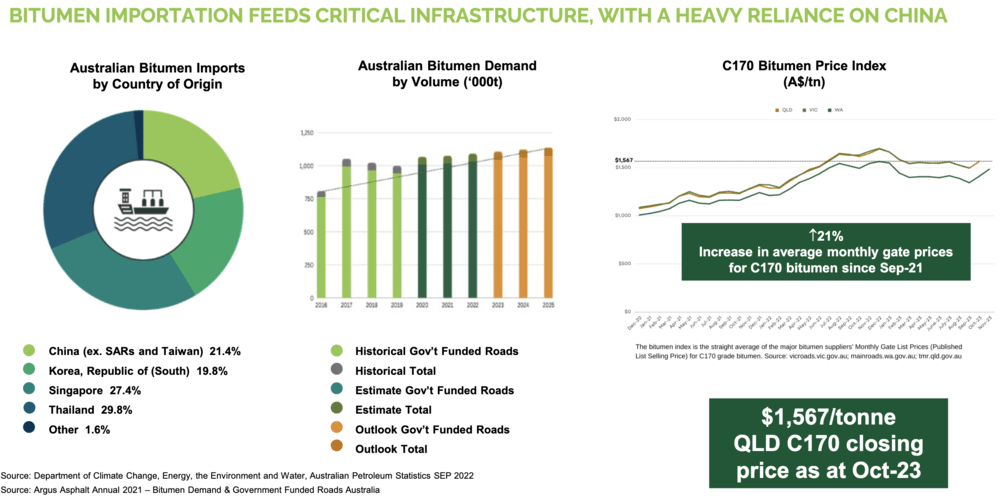Can Greenvale Energy’s bitumen dream become a reality at its one-of-a-kind Alpha torbanite project?

Greenvale Energy aims to be Australia’s only end-to-end bitumen producer. Pic via Getty Images.
- The Alpha torbanite deposit contains up to 698L of hydrocarbons per tonne – an exceptionally high grade used to make bituminous products
- It’s the only known torbanite project in Australia
- Australia has >870,000km of roads, making it one of the highest consumers of bituminous products globally
- Updated Mineral Resource and liquefaction results to underpin Pre-Feasibility Study for project development
Special Report: In its push to become a sustainable producer of bitumen to feed the growing infrastructure needs of Australia, Greenvale Energy is accelerating its flagship Alpha torbanite project in QLD – an exceptionally high-grade deposit which contains up to 698L of hydrocarbons per tonne.
Torba-whaaa?
Torbanite is an organic-rich sedimentary rock formed in a lacustrine (lake) environment which is extremely rich in hydrocarbons.
That’s important, because hydrocarbon content in torbanite determines the application it can be used for, and the Alpha project has such high grades – some of the highest globally – it can produce high-value bitumen binding products.
Using liquefaction low-emission processing techniques, Greenvale Energy (ASX:GRV) aims to become Australia’s only end-to-end producer of bitumen binding products.
Australia: one of the largest consumers of bitumen
Bitumen, also known as heavy or extra-heavy crude oil, is a dense and viscous form of petroleum often overshadowed by its lighter counterpart used in petroleum products.
Despite its lesser-known status, bitumen is a valuable industrial commodity, particularly for infrastructure development.
Its primary use in sealing roads enhances their durability and weather resistance, a critical consideration in challenging climates, such as certain regions of Australia, making it a vital component in the construction and maintenance of >870,000km of roads across the nation.
Currently, Australia imports >1Mt of bitumen each year, with a significant chunk originating from China. This heavy reliance on external sources raises concerns about the security of supply for this essential, yet overlooked product.
GRV CEO Mark Turner says there are major factors making the Alpha project worth development.
“We’ve become heavily reliant on the overseas market and the price of bitumen has gone up significantly in the last 10 years, so has import costs and the price of oil – so for us to become a domestic supplier of bitumen is an attractive business opportunity.”

Alpha – a one of a kind project
Discovered in 1939 and having gone through numerous testing and analyses, the Alpha project has long been considered the only shale deposit of its type containing high-value torbanite, as well as cannelite – another type of bituminous coal that holds value for the Australian market.
The company has now upgraded the resource at the Alpha project following completion of Phase 2 drilling in early October, which saw the drilling of 20 holes for 1,053.5m, resulting in a whopping 51% resource upgrade to 28Mt.
Turner says the company started looking into a process called liquefaction and how much more yield it could get out of the torbanite and cannelite at Alpha.
After three rounds of test programs, GRV’s technical advisor PROCOM confirmed the ability to obtain greater yields from cannelite than first observed, with a third test seeing a 30% increase in potential synthetic oil production to 27.7Mbooe of torbanite and cannelite.
Then, in December last year, in a significant milestone for Test Program Four at Alpha, Greenvale’s technical bitumen advisors, Technix, in collaboration with PROCOM assessed the initial liquefaction bulk samples and separated the remaining solids and the produced oil.
The bulk sample analysed “has very promising properties”, according to GRV.
The asphaltene content of the produced oil extract is higher than that of the standard bitumen at approximately 55% (55.3% heptane insoluble), while the asphaltene content of standard bitumen varies up to 25%.
Turner, who has over 25 years of experience in the energy sector, says Australia doesn’t really produce heavy crude oil anymore. There are only two refineries left in Australia, one in Geelong and one in Gladstone, yet both are light crude oil refineries.
“We are in the unique position that we have got the only commercial reserve of torbanite in Australia, if not the world.”
This article was developed in collaboration with Greenvale Energy, a Stockhead advertiser at the time of publishing.
This article does not constitute financial product advice. You should consider obtaining independent advice before making any financial decisions.
Related Topics

UNLOCK INSIGHTS
Discover the untold stories of emerging ASX stocks.
Daily news and expert analysis, it's free to subscribe.
By proceeding, you confirm you understand that we handle personal information in accordance with our Privacy Policy.








